Although Apple has repeatedly said that its iTunes Store operates at "just above break even," a thorough analysis of the service's economics suggests it turns a profit roughly in line with the company average, with recent events paving the way for even greater gains.
A breakdown of per-song fees
"For each $0.99 song, we estimate that Apple pays $0.70 to major labels, which own over 85 percent of the market, and $0.60 to $0.65 to independent labels, which drives an average price per song of approximately $0.69," he explained. On top of that, of course, are Apple's network fees, transaction fees, and general administrative expenses associated with operating the iTunes Store.
Hargreaves calculated the network fees at $0.05 per song, which includes the delivery fee, and the hardware and software to facilitate delivery. "Operating expenses are likely less than $0.05 per song, based on the relatively small number of employees we believe work on iTunes," he wrote.
Then, of course, there's the transaction fee — or royalty paid to credit card companies each time a sale is processed — which Hargreaves argues is "the primary reason iTunes profitability has not been higher historically." However, he notes hat Apple has recently adopted a number of measures to limit those fees, such as managing a weekly sweep of its credit card transactions, broadly distributing gift cards, and by encouraging larger transactions through services such as "Allowance."
Therefore, the analyst believes the iPod maker is now forfeiting only around $0.10 per song per song to credit card firms, compared to as much as $0.25 per song when iTunes first launched. "Going forward, we expect Apple to continue improving its payment schemes to cut down on transaction fees and improve the profitability of iTunes," he added.
Based on those cost estimates per song, Hargreaves arrived at the 10 percent margin estimate. Applying that estimate to the $1.2 billion in revenue that iTunes is expected to generation in fiscal 2007, he believes the service will generate $0.09 to $0.14 in earnings-per-share for Apple.
DRM-free tracks present incremental profit opportunity
Perhaps even more compelling, according to the PacificCrest analyst, is the incremental profit opportunity presented by the Cupertino-based firm's joint announcement with music label EMI to start selling DRM-free tracks at an approximate 30 percent premium.
"Consumers desire for mobile content drove the explosion in digital music and the growth of iPods. However, consumers became enamored with the quantity of music that the iPod enabled them to access, and sacrificed quality, in our view," he wrote in the report. "Going forward, we believe that consumers will expect mobility and will increasingly look for higher quality as the next step in improving their music experiences, particularly as consumers increasingly use iPods and iTunes as a source of content for home and car stereos."
Hargreaves cited sources who suggest that the economic split between EMI and Apple is likely to remain constant for the higher-quality, DRM-free songs that begin to crop up on iTunes starting next month. Since the songs will retail for $1.29 rather than $0.99, he estimates Apple to receive $0.09 of incremental gross profit per song. While delivery fees should double due to the larger file size of higher-quality songs, the analyst has assessed those network costs at $0.02 or less per song.
Assuming that half of EMI tracks purchased through iTunes will be of the higher-quality DRM-free tracks, Hargreaves estimates the move could generate approximately $24 million of incremental revenue, and just under $6 million of incremental profit for Apple in a year. In his note to clients, the analyst acknowledged that those numbers may seem insignificant, but said they would grow quickly if other labels followed suit in offering the DRM-free tracks.
Another source of incremental iTunes revenue could arrive in the form of an iTunes subscription service. According to the report, Apple has already developed and is capable of launching such a service but has thus far found no compelling reason to do so. However, Hargreaves believes that an increase in competitive offerings and pressure from iPhone mobile carriers could force Apple add the service within the next 18 months.
"Carriers are in the unique position of having a network that can deliver music, a captive customer base of billions of people, and ubiquitous devices that are capable of playing music," he wrote. "We expect approximately 1 billion music-enabled phones to be sold next year. As network speeds increase, battery life on cell phones improves and storage grows, we believe that music offerings from carriers will become extremely viable competitors with iTunes."
However, the analyst believes an iTunes subscription service could prove to be beneficial to consumers while helping to monazite the iPod install base, rather than simply representing a defensive move on Apple's part. Based on a customary 50/50 split of a $10 to $15 monthly subscription charge between Apple and the labels, the iPod maker could see $900 million in added revenue should such a service penetrate to just 10 percent of its iPod base.
Keep an eye on April 28
Hargreaves in his report hinted that some of the aforementioned changes could arrive sooner than later. He notes that Apple launched iTunes on April 28, 2003 and that it typically negotiates one-year contracts with the labels. "As a result, we believe that the company is currently in renegotiations for its current contracts. Apple will likely maintain its firm grip on digital music in the near future, regardless of whether changes to iTunes are included in the current round of negotiations," he wrote. "However, 80 percent of music is still purchased in physical form, which suggests that the digital music market is still young. If Apple intends to keep its hold on digital music over the long term, we believe it will eventually have to become as innovative with iTunes as it has been with its hardware."
Apple priced at $130 a share
Hargreaves maintains an outperform rating and $130 price target on shares of Apple for PacificCrest.
 Katie Marsal
Katie Marsal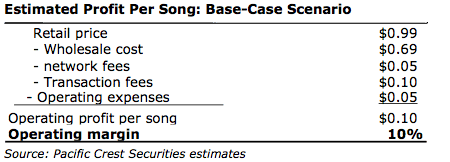




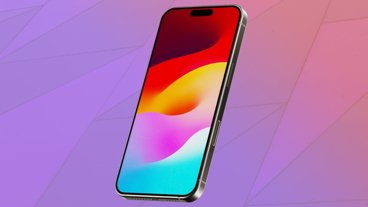


-m.jpg)






 Christine McKee
Christine McKee
 Malcolm Owen
Malcolm Owen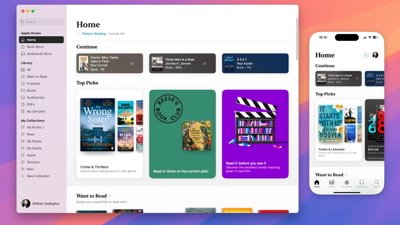
 William Gallagher
William Gallagher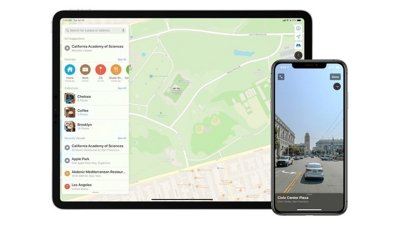



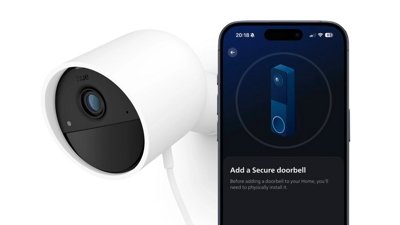









41 Comments
I wonder how much more it costs for iTunes to offer 256 kbps music instead of 128kbps. Also, anyone know how many songs an iPod can hold that is filled with 4 minute songs at 256 kbps?
Probably holds roughly half as many at 128k?
Well people are saying 256kbps isn't twice as good as 128kbps so I was just wondering what the exact number was, but thanks.
Subscriptions just don't make sense for music. Apple is pushing for DRM-free tracks and succeeded with EMI's deal - adding a subscription model now would mean putting DRM back in.... no thanks... now a movie-rental service would be a good idea...
They should make a few Euors too if they ever get Movies and TV Shows into Europe.